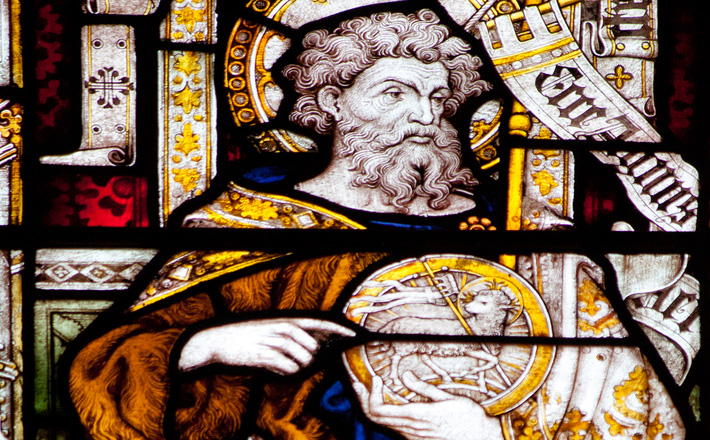Commentary on Psalm 40:1-11
Most of us can read Psalm 40 and admire its words, the depth of thought and faith conveyed in its phrases.
But who among us can with any candor say “I waited patiently for the Lord”? When did I ever wait for anything at all without frustration or anxiety?
We wait in traffic, wait for things to get better, or wait in the waiting room. We are no good at waiting. We want to get moving, we can’t bear wasting time, and the clock is ticking while we just don’t know what will unfold next. Patience is listed by Paul as a “fruit of the Spirit,” which it must be for somebody, somewhere, but not me, or at least not yet. I can’t muster it; maybe a miracle will dawn.
This Psalm isn’t a prayer so much as a report on a prayer. In Bible times, if you were under duress, you would pray and ask others to pray — and then later you would share what that was like, what transpired, and what God had done. If God does something good for us, can we find the words to share? This might be of help to someone else struggling, and might even make us more solid in our sense of God’s goodness. The good that God does isn’t precisely what we might have asked for, but that is no barrier to testimony.
Psalm 40 sounds notes in its melody that harmonize with so many tunes in Scripture.
- “Here I am” — the words Isaiah used to reply affirmatively to God’s call (Isaiah 6).
- “Here I am” — the same words a later follower of Isaiah used to depict the way God is there for us but we don’t go looking for God: “I was ready to be sought by those who did not ask for me; I said ‘Here I am’ to a nation that did not call on my name” (Isaiah 65).
- Psalm 40’s image of God’s law not being something out there we try to absorb and translate into action, but it is actually inscribed directly onto the inner heart: Jeremiah longed for such a day (Jeremiah 31).
In fact, this Psalm must have been a favorite of the prophets, with the talk of God not wanting burnt offerings. Actually, God might wind up with even more burnt offerings and more abundant sacrifices if the Psalm’s objective could be won: what God wants is “an open ear,” and a “delight” in doing God’s will.
The Hebrew for this “open ear” means literally “ears you have dug out for me,” as if our ears are jammed with gunk and wax, and only if God can bore it all out can we actually hear God! What fills our ears so we cannot hear God? And is the doing of God’s will a chore? A duty? Or is it a delight? Young lovers take great delight in doing any little favor for the beloved; can we be as eager and gleeful to do favors for God?
Verse 4 poses some intriguing translation challenges. The NRSV offers us, “Happy are those who make the Lord their trust” — an understandable but problematical shift from the RSV, “Blessed is the man who makes the Lord his trust.” The Psalmist would quickly grant us that “man” is embarrassingly restrictive, and that women or children also are blessed when the Lord is trusted. We also see a shift in number: “those” versus “the one.” Again, the Psalmist expected many readers, but yet there is a deeply personal, occasionally lonely burden on the single individual to make this choice of trust — although doing it together makes it easier, and more sustainable.
But is “Happy” much like “Blessed”? The Hebrew ‘ashre doesn’t mean “happy” the way modern people conceive of it — feeling good, enjoying things, smiles and fun chums around. The word ‘ashre implies a state of the soul, a gift only God can bestow, something steady, not a fleeting emotion or anything that can be ruined by circumstance. If we call this “happiness,” then we are rather wonderfully redefining happiness.
The happy or blessed one “makes the Lord his trust” — and history has taught us that those who trust in the Lord are not comfortable or sheltered from difficulty, but may well find themselves in difficulty, and even in agony because trusting God means we serve God courageously in a world that is not in sync with God. This blessedness/happiness is a puzzle to those on the outside, but the calming heartbeat for those who’ve known this trust.
And, whether we like it or not, this brand of happiness/blessedness has an eschatological dimension. The last verse of our lection prays to the Lord, “Let your steadfast love and your faithfulness keep me safe forever.” It is God’s steadfastness, God’s faithfulness, that will endure and win the day; if we triumph it is God doing so vicariously through us. And the “forever” the Psalmist had in mind was probably just in this world — for a very long time here in my earthly life.
But we know something about eternity, about the time beyond that measured by time. The happiness/blessedness we crave may be glimpsed here and there, or enjoyed for a while, but then not… and yet we believe that if we trust the Lord, if we believe and adhere to God, after this world is no more, after God has brought all things to consummation, there were be a happiness exponentially more giddy than even the ultimate happiness the world seduces us with. This relationship with God, begun now, known through a glass darkly, will finally be reality, and all will be joy.


January 19, 2014